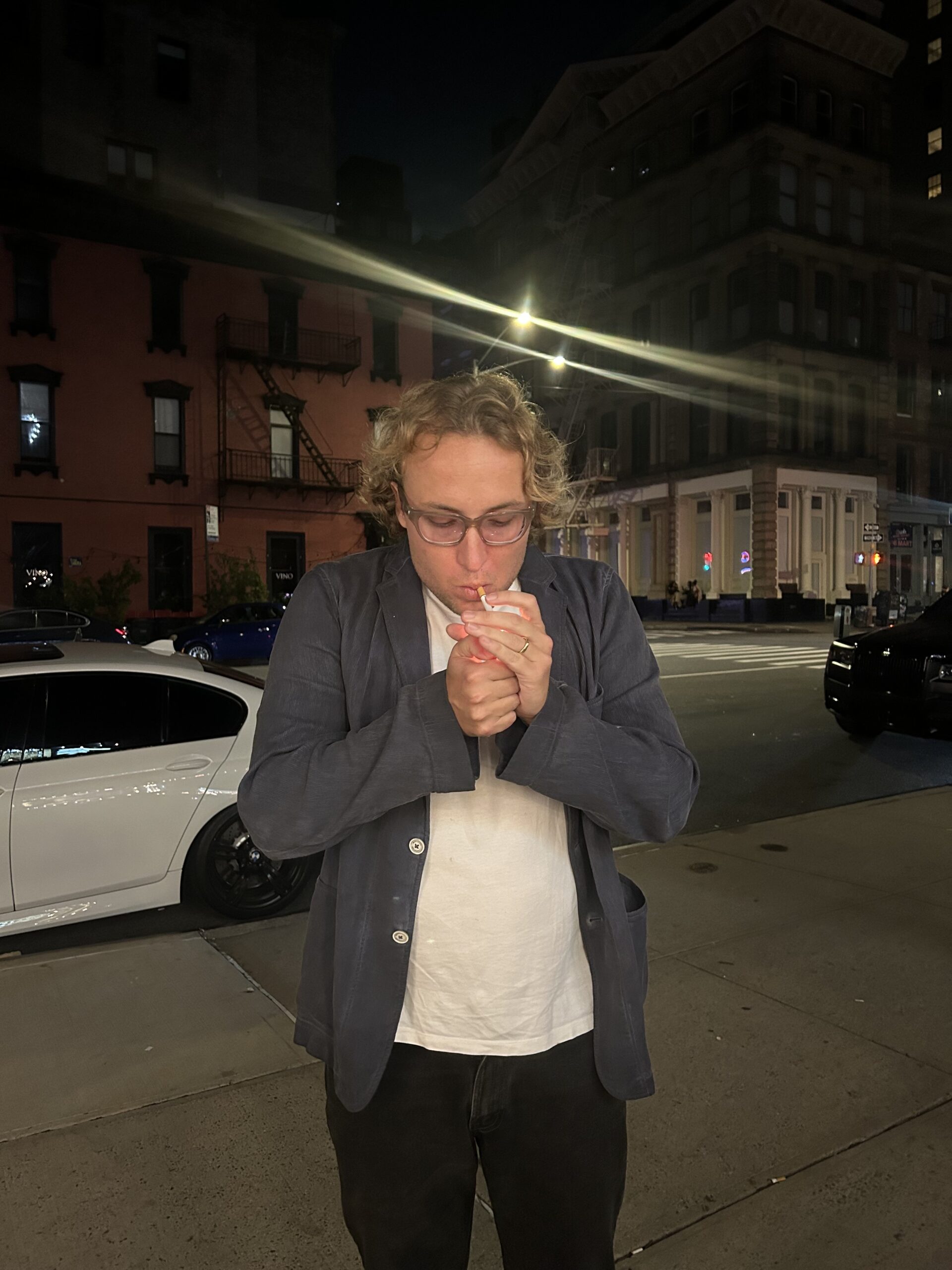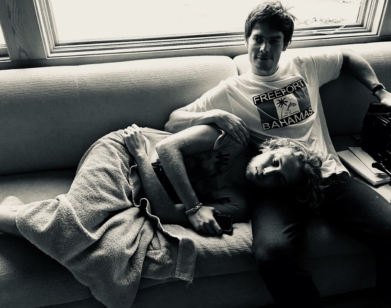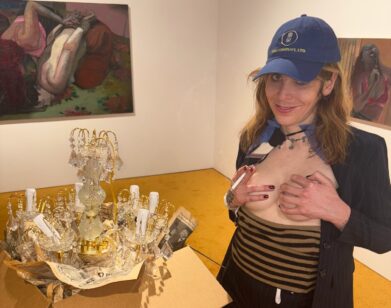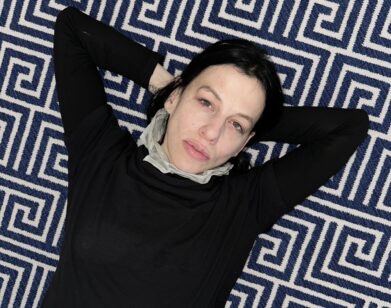SMOKE BREAK
“It’s My Dark, Twisted Fantasy”: A Nine-Minute Cig With Filmmaker Olmo Schnabel
STOUT: We’re here with Olmo Schnabel at The Roxy. How are you feeling?
OLMO SCHNABEL: I feel good. I waited a long time to be able to show the film. It’s just so hard to get work out into the world, especially when it doesn’t adhere to certain rules. Now it’s been out for a year, so to finally be able to show it in my hometown is incredible. It’ll be released in February, but I hope people show up so that the film can actually have a long life in theaters. That’s the only way these things can stay alive, because we don’t have the backing of a studio or anything.
STOUT: I was thinking about how perfect it is that it’s shown at the Downtown Festival, and it’s really a movie about downtown. That seems very meta.
SCHNABEL: Yeah. I mean, it’s all I know. When they told me about this film festival, I knew it was their first year, but any opportunity to be able to screen it, especially to the demographic of people that will respond, was perfect. Everything comes full circle. Obviously, we’re from downtown, so we need to cultivate this community and we shouldn’t let it fall by the wayside.
STOUT: Do you have a favorite block?
SCHNABEL: I mean, I grew up on 11th Street. I love the West Village. It always felt like home, and it also felt like a village in a city that was a concrete jungle. I love the peace and quietness of Greenwich Village. I wouldn’t be able to tell you what my favorite block is because I’m constantly walking down the street like, “Wow, I love it here.” I’m constantly being surprised. Especially since I’m away all the time now, every time I come back, I realize new things.
STOUT: Yeah. Let’s talk about the film, because there’s so much to talk about.
SCHNABEL: It’s like a melting pot of a million different ideas and relationships put into one thing. The idea was to really take a full swing, not stay small. It was to do what people were telling us was impossible. The film is an exorcism of sorts for me to put all this stuff out there, and not have to live with it as an experience, or as a trauma. I don’t need to just live with it inside of me, neither did Jack.
STOUT: You were in Mexico while you were developing the film. Do you think that distance gave you a bit of relief?
SCHNABEL: 100 percent. The film is my experience as a New Yorker, but also from afar, looking back at the city. It’s a romantic point of view of what the city could have been, or what I wish it was still. The whole thing is a fantasy. They’re doing a bunch of stuff that you would never be able to do now with phones and cameras and stuff. I don’t know. It’s my dark, twisted fantasy, this sex- and drug-crazed odyssey in New York City.
OLMO’S FRIEND: I have something for you. [Hands him a cigarette inside a sunglasses case]
STOUT: Aww. What are these? Are they hand-rolled?
FRIEND: The menthol experience. A little part of me. In the sunglasses case.
SCHNABEL: Oh, wow. There you go. I’m going to finish this and then we’ll hang out.
STOUT: Cute. Anyway, it’s a fever dream on film.
SCHNABEL: Yeah, yeah. Also, shooting it on 35mm. Less and less people tell you that’s not possible, and I think it looks like something that was made a long time ago. It’s supposed to be contemporary, but you don’t have the presence of phones.
STOUT: Also, there’s so many cigarettes in the movie. I feel like there’s not enough cigarettes in films now. The atmosphere that you created is really special.
SCHNABEL: It’s intimate. Also, when I left New York, what I knew would make it my film was adding this part in Mexico, which might seem like it’s deviating from the core of the story. But it’s my experience. It’s honest to whatever the hell is going on in my mind.
STOUT: I feel people with a foreign mom, though, can relate to both moms in the film.
SCHNABEL: Yeah. My mother’s Spanish. I was very connected with my mother, but I imagine that if you’re American and you don’t learn your mother’s language, there can be a huge cultural disconnect. My mother was always my best friend and I could tell her everything. And I think that, in Diana’s case, they probably had a relationship before that had changed. That’s why she was so troubled about what was happening with her son. And then, with Alejandro’s character, his mother is obviously—
STOUT: I honestly thought they were lovers.
SCHNABEL: It’s supposed to be like that. And then, all of a sudden…
STOUT: Yeah.
SCHNABEL: You know? I love that scene with the mother at the beginning of the movie. It’s so incestuous and weird, but there’s a lot of love and tenderness there. When he runs her over, I think he basically unleashes his worst nightmare. He becomes his own worst enemy.
STOUT: That was the catalyst for him turning into a monster.
SCHNABEL: He could do anything after that. Because he was unleashed. He’s just in the spiral because he has nothing to lose, so his behavior is not of someone who wants to succeed. He just wants to get caught.
STOUT: Self-destruct.
SCHNABEL: Yeah, he knows that his life has an end. Pain creates something, and that’s what happens. If your life gives up on you, how are you supposed to continue to be a good person?
STOUT: Who do you relate more to out of the two characters?
SCHNABEL: Definitely Jack.
STOUT: That’s probably good. What was it like to work with Willem Dafoe and Emmanuelle—
SCHNABEL: Seigner and Maribel Verdú? It’s a dream come true to have these people show up and support you. When I’m going through rough times, I need to remember how good I felt when these people signed up. That was the best feeling ever, having these actors I grew up admiring. I never imagined I’d be able to work with any of these people. Having Maribel Verdú play a version of my mother, I had my mother watch that when I was filming that scene. She was sitting next to the monitor with me and I looked at her like, “Did we get it?” She’s like, “We got it.” And then I stopped filming it.
STOUT: That scene was so great. So, what’s next?
SCHNABEL: It probably will be something completely different. People ask me what my style is, because the movie’s stylized. But I don’t think that’s my style. I think that’s just the style of the movie.
STOUT: But are you drawn towards that frenetic aesthetic? Are you the third Safdie brother?
SCHNABEL: I mean, I have massive amounts of respect and admiration [for them] but I think I’m a different filmmaker, and I would never want to put myself in there. I’d be lucky to be in the same conversation. But no, I’m just myself.
STOUT: What’s the after party?
SCHNABEL: There’s going to be something now. I’m kind of tired, but I’ll go there for a little bit and then run away.








